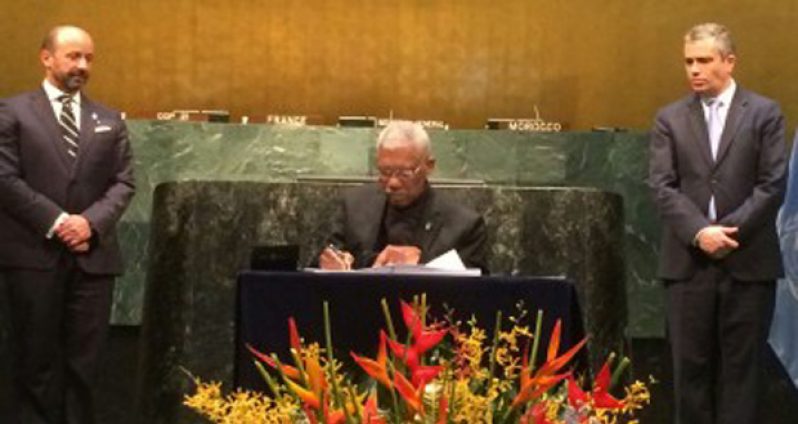GUYANA on Friday signed on to the Paris Agreement, with President David Granger saying that Guyana will spare no effort to contribute to both a sustainable future and to an effective global response to climate change.The Paris Agreement, reached on December 12, 2015, is the most ambitious international environmental agreement in modern history. It presents a historic opportunity for the global community to respond to the challenge of climate change in an appropriate manner.
Guyana has signed the ‘agreement’ on account of its recognition of the need for resolute action to combat this challenge.
“We will ensure the deposit of the instruments of ratification this year,” the President said, pointing out that Guyana is a net carbon sink and “Our forests sequester more carbon than the country’s human activities generate.”
Guyana, with the world’s second highest percentage of rainforest cover (85 per cent), commands important carbon stocks.
Guyana, nevertheless, is fully committed to contributing to limiting the rise in global temperature to below 1.5 degrees Celsius.
“Guyana intends to implement initiatives in the forest and renewable energy sectors, including through the Reducing Emissions from Deforestation and Forest Degradation (REDD) Plus programme.
“We will move closer towards a 100 per cent renewable power supply by 2025, conditional on appropriate support and adequate resources.
“Our proposed commitments through avoided emissions can contribute the equivalent of up to 48.7 million metric tonnes of carbon dioxide to the global mitigation effort.
“Guyana is prepared to sustainably manage, conserve and protect our national patrimony, and place our ecological resources at the service of humanity,” President Granger said.
Guyana, in the short-term, up to 2020, will improve timber monitoring and maintain a high level of timber legality; increase value-added activities in the forestry sector so as to augment carbon storage in long-use wood products; intensify the sustainable management of indigenous communities which own and manage 14 per cent of national territory; introduce a national Emissions Reduction Programme (ERP) to add two million hectares under conservation; encourage more efficient mining and logging activities and implement Reduced Impact Logging(RIL); and invest in solar power, wind power and hydropower to transition more rapidly to renewable sources of energy and reduce dependence on fossil fuels.
“The Cooperative Republic of Guyana, by signing the Paris Agreement today [Friday], demonstrates its total commitment to advancing solutions to this most pressing global challenge.
“I assure you of Guyana’s continued commitment to implement this historic ‘Agreement’ to make the world a better place for us and for future generations,” President David Granger concluded.
RECORD NUMBER
According to the BBC, some 171 countries inked the deal on Friday, a record number for a new international treaty.
About 15 nations, mainly small island states, had already ratified the agreement, but dozens of other countries were required to take this second step before the pact came into force.
UN Secretary-General Ban Ki-moon said: “Paris will shape the lives of all future generations in a profound way; it is their future that is at stake.”
Speaking at the opening ceremony, he said the planet was experiencing record temperatures: “We are in a race against time; I urge all countries to join the agreement at the national level.
“Today we are signing a new covenant for the future.”
As the world marked the 46th Earth Day, UN climate chief Christiana Figueres explained what now needed to happen:
“Most countries, though not all, need to take the signed document and go back home and go to ratification procedures. That, in most countries, requires parliamentary discussion and decision,” the BBC quoted her as saying.
US President Barrack Obama is also keen to see the new agreement take effect before he leaves office next January.
A little known clause in the treaty means it would take four years if a new leader, less committed to climate action, wanted to take the US out of the agreement.
“We don’t know who the next President will be and what stand the new administration will take,” India’s environment minister Prakash Javadekar told BBC News.
“What happens in the US will have a definite bearing on how the world takes all these ideas and commitments and pledges in effect. So people are eagerly awaiting what happens in the US.”
The BBC reported that China said it would “finalise domestic procedures” to ratify the Paris Agreement before the G20 Summit in China in September.
There is obvious delight here in New York at the record turnout of countries and leaders to sign the agreement. But some attendees are cautioning that this is merely the first rung on a very difficult ladder.



.jpg)








